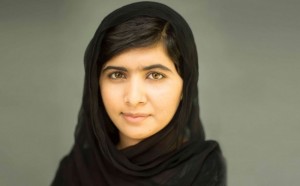The Nobel at last. With every foreign plaudit, Malala more suspect in Pakistan
 Reprising somewhat a blog from this time last year, but highly relevant this Nobel season.
Reprising somewhat a blog from this time last year, but highly relevant this Nobel season.
Now that Malala Yousafzai has received the highest honour possible, it might not be a bad idea to look back to early October 2013. It was Nobel Prize time and everyone was in a fever of excitement about a possible Malala win.
At the time ABC newtwork was twhooping (whooping via twitter) that it was ‘Malala Week’ for them.
On the BBC’s Panorama programme, also broadcast last year, Anglo-Pakistani presenter Mishal Hussain returned to the valleys she herself had once known as a child on holiday. In Swat, she found Malala’s former classmates proud of her, but almost everywhere else, particularly in Islamabad, there was suspicion of her prominence in the West. Even Sartaj Aziz, urbane and so much a man of the world, was doubtful about Malala’s relevance to the debate about education in Pakistan. Mr Aziz, the Pakistani prime minister’s adviser on national security and foreign affairs, refused to describe her as a national embarrassment but insisted she conveyed an inaccurate picture of girls’ education in his country. “The image it created…is not true,” he said.
It’s hardly new, this tendency to shoot the famous messenger, especially one who brings bad news. The parallel is not exact by any means, but remember Aravind Adiga’s Booker Prize-winning novel ‘The White Tiger’, in which he brilliantly captured the unspoken voice of people from “the Darkness”, the impoverished areas of rural India? India Shining didn’t like it.

